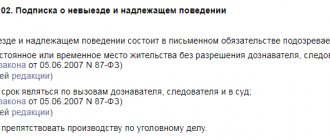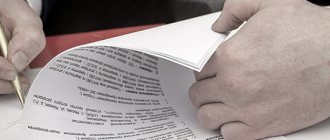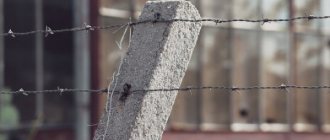A recognizance not to leave is a measure to restrain a person who is accused or suspected of committing a crime from carrying out actions that could interfere with the investigation. This preventive measure is provided for by the norms of the Criminal Procedure Code of the Russian Federation. Article 102 of the Code of Criminal Procedure of the Russian Federation determines that a written undertaking not to leave the place and proper behavior is a written document signed by the accused or suspect, based on which he undertakes:
- do not leave your place of residence without permission from the investigative or inquiry authorities;
- appear when summoned by investigative and inquiry authorities, as well as the court, on time;
- not to interfere with the criminal proceedings by any means.
Definition
What is a recognizance not to leave? According to Art. 102 of the Code of Criminal Procedure of the Russian Federation is a criminal procedural measure of restraint applied at the stage of trial or investigation and chosen in relation to a specific person (accused or suspect).
The essence of a recognizance not to leave is the written imposition of certain obligations limiting freedom of movement. Among them are:
- Do not leave your place of residence (permanent or temporary) without the permission of the judicial authority or the official investigating the case. In this case, the address recorded in the documents is indicated by the accused himself. In this regard, the person against whom this preventive measure has been chosen is obliged to notify the investigator even about those moves that are made within one locality, not to mention trips to another city or region;
- To appear at the summons or invitation of an investigator, judicial authority or interrogating officer within a strictly prescribed period;
- Do not interfere with the proceedings of the case;
- Do not take actions that put pressure on participants in the process. This means that it is better for the suspect or accused to exclude any contact with people who take part in the criminal process and can influence the course of the investigation (victims, experts, witnesses, their relatives and loved ones).
A written undertaking not to leave allows a citizen to lead a full life - go to work, move around the city, meet with friends, etc.
Summary
A recognizance not to leave is the mildest preventive measure provided for by the Code of Criminal Procedure of the Russian Federation. It is used if the investigator, inquiry officer or judge has no reason to believe that a person will interfere with the investigation, put pressure on witnesses or flee from justice. This restriction is introduced so that officials can call a person for questioning at any time.
How long a recognizance order is valid depends on the category of person against whom restrictive measures have been imposed. If this is a suspect, then 10 days after their introduction the person must be charged or released and all restrictions lifted. If we are talking about the accused, preventive measures, as a rule, are not canceled until the sentencing.
The court, inquiry officer or investigator may impose a more stringent measure of restraint, up to and including detention and house arrest, if the citizen violates the requirements. Therefore, you should fulfill your obligations, not leave the locality and not change your place of residence without the approval of the official. This does not mean that a citizen cannot leave the city at all. It’s just that every time you leave you will have to contact the investigative agency or court for permission.
Grounds for recognizance not to leave
In what cases is a written undertaking not to leave the place used? This type of preventive measure is chosen:
- If a citizen obstructs the investigation;
- If there is a risk of destruction of direct or indirect evidence;
- If there is a risk that the accused or suspect may pose a threat to the health and life of the participants in the case;
- If there is a risk that the accused or suspects will continue to commit crimes;
- If there are fears that the accused or suspect will hide from the investigation and law enforcement agencies.
A preventive measure in the form of a recognizance not to leave the place is chosen only when committing a crime of moderate or minor gravity, that is, only in the case when the offense does not pose a danger to society, and the penalty is not associated with imprisonment.
Who is not given a written undertaking not to leave?
As for persons in respect of whom a recognizance cannot be applied, these include:
- Citizens who are accused or suspected of committing grave and especially grave acts;
- People whose professional activities involve frequent travel and business trips (conductors, truck drivers, etc.);
- Military personnel on compulsory service do not have the right to leave the unit without the permission of the commander, and therefore will not be able to appear when called by the bailiff;
- Persons who do not have permanent or temporary registration and are in a given locality on a business trip, visiting, on vacation or for sanatorium treatment;
- Diplomatic couriers;
- Witnesses. Can a witness be given this preventive measure? According to the law, this cannot be done, but he may be given an obligation to appear (Article 102 of the Code of Criminal Procedure of the Russian Federation), forcing him to inform the investigation of his place of stay and appear at the first request of the interrogating officer.
When making a decision on the use of this preventive measure, the investigator or judge evaluates all objective and subjective factors.
If there is the slightest doubt that a citizen will strictly fulfill the obligations given to him, other methods of restricting freedom are chosen (house arrest or detention).
Violation
It is considered a violation of the subscription to travel outside the locality without first obtaining permission from the prosecutor or judge.
Violation of this obligation leads to a tightening of restrictions on freedom. A citizen may end up under house arrest or in prison. In addition, this circumstance may be taken into account during the trial, which will not work in favor of the defendant. If there are serious circumstances, a person has the right to contact an investigator or a judge, depending on the stage of the investigation, and receive permission to leave the locality for a certain time. To do this, you must draw up a written statement stating the reason for the trip and its duration. If the responsible person considers the specified reason to be valid, he will issue permission for the person to leave the locality.
Who is authorized to choose a recognizance not to leave?
A written undertaking not to leave the place and proper behavior as a preventive measure can be chosen by a circle of persons specified in the Code of Criminal Procedure. These include employees conducting inquiries, investigations and trials.
If a suspect or person under investigation needs to leave their place of stay or residence, they must submit a written request to the head of the investigation.
The official conducting the inquiry can either allow these actions or prohibit them. The response to the petition is drawn up in 2 copies, one of which is given to the accused or suspect.
On a note! The refusal of the application can be appealed to the prosecutor's office.
Threats as a basis for issuing a subscription
Undertaking not to leave the place - do not violate it!
There are cases in which there is a possibility that the suspect (accused) may threaten or commit illegal actions against persons appearing as witnesses in the investigative case. In such cases, a restriction in the form of issuing a subscription is also used.
Thus, in this case, such a document will act as a guarantee that the suspect (accused) will not interfere with the investigation. In reality, of course, a citizen who has committed a serious criminal act will not be stopped by a written undertaking not to leave the place and he will try to interfere with the investigation, sometimes not even on his own, but through his accomplices. Unfortunately, such actions can be very difficult to detect.
Accordingly, the document itself cannot guarantee full 100% fulfillment of the specified conditions, therefore, in certain cases, instead of issuing it, more serious measures are prescribed, such as arrest for the period of investigation and trial.
Issuance procedure
According to the legislation in force in Russia in 2022, the procedure for issuing this preventive measure consists of several stages (Article 101 of the Code of Criminal Procedure of the Russian Federation):
- Adoption of a resolution (by the investigator) or a ruling (by the court) regarding the choice of a recognizance not to leave as a preventive measure.
- Drawing up the text of a document that indicates the type of criminal act and the grounds for issuing a recognizance not to leave a person.
- Announcing this decision to the suspect or accused.
- Explaining to the citizen the conditions and grounds specified in the document. If this step is skipped, the suspect or accused can issue a waiver.
- Explaining to the person the procedure for appealing the decision to apply the specified preventive measure.
- Signing of a document by a citizen to whom it applies. This procedure takes place in the presence of authorized bodies and parents, guardians or guardianship authorities if the signatory is a minor.
Is it possible not to sign a written undertaking not to leave? It is undesirable to do this, otherwise another measure of restriction of freedom will be applied.
If you categorically disagree with this decision, go to court with a corresponding complaint.
Responsibility for violation of subscription
What happens if you violate the preventive measure? In Art. 110 of the Code of Criminal Procedure of the Russian Federation states that violation of obligations under a written undertaking not to leave is grounds for replacing this preventive measure with taking into custody or house arrest.
Their validity period is similar to the validity period of the undertaking not to leave, that is, until the end of the investigation or trial. To change the preventive measure, a corresponding resolution is issued.
The situation may worsen if the inquiry officer, investigator or judge suspects that the suspect or person under investigation wants to hide from law enforcement agencies or intends to obstruct the investigation.
If he still manages to do this, but is subsequently discovered by investigative authorities, more stringent measures may be applied. Thus, a person who has violated the terms of his recognizance not to leave is put on the criminal wanted list.
In the future, his capture could lead to serious consequences, including imprisonment. In addition, such behavior can adversely affect the course of the investigation and the trial.
If a citizen has violated the terms of the document unintentionally, upon arrival home he must urgently appear before a judge, investigator or interrogator and repent of his action.
The procedure for choosing a preventive measure
A recognizance not to leave can be issued on the basis of two documents:
- Resolutions on the selection of a preventive measure.
- Actually the subscription itself.
The procedural measure is determined by a court decision or an order of the investigator. The will to accept it must also come from the person under investigation, which is confirmed by his written consent. In a situation where a preventive measure is appointed by the court, the decision on its selection must be entered into the court record.
This type of restriction can be chosen provided that the citizen has a permanent or temporary place of residence. This fact can be confirmed by having a valid registration.
The preventive measure in question is not unilateral; the suspect or accused must personally attest to it with his signature. This should be considered as a personal promise made by a citizen (this interpretation corresponds to paragraph 3.4 of the Tokyo Rules, adopted by UN General Assembly Resolution No. 45/110 on December 14, 1990). This position is also shared by the Constitutional Court of the Russian Federation, as follows from its ruling No. 66-0-0 of January 26, 2010. If a citizen refuses to give a subscription, it must be replaced with another preventive measure. In this case, to ensure the fulfillment of the tasks assigned to justice, more stringent restrictive measures may be applied to it.
A recognizance not to leave may also be imposed if the court replaces it with a more serious preventive measure in accordance with Art. 110 of the Code of Criminal Procedure of the Russian Federation. In this case, a copy of the court decision must be sent to the administration of the pre-trial detention center, and the signature taken from the released person must be attached to the criminal case.
The resolution must contain the grounds for prescribing a preventive measure given in Art. 97 Code of Criminal Procedure of the Russian Federation. Its text also indicates the circumstances that were taken into account during her election.
Duration of restriction of freedom of movement
The validity period of the recognizance not to leave is established by the inquiry officer, judge or investigator . This information is not indicated on the form itself, but all authorized persons are required to know the exact period of time this preventive measure is in effect:
- Until the end of the preliminary investigation;
- For the period of preliminary investigation;
- During the trial.
But there are also clearer deadlines . Thus, a recognizance not to leave the place issued to a suspect is valid for only 10 days. At the end of this period, he must either be cleared of suspicion (due to lack of evidence) or charged.
If the latter does not happen, the preventive measure is lifted automatically. In this case, it is necessary to obtain a resolution to cancel the travel ban from the official who issued the subscription. The document issued to the witness has the same validity period.
How long is this preventive measure given to the accused? In this case, it will remain in effect until the verdict is pronounced.
Validity
The undertaking not to leave does not have clear terms
If we summarize all of the above, it becomes clear that the subscription is a document that guarantees that the participants in the investigative process will not leave the territory of residence (without the consent and notification of the authorities) and will take the necessary part in the investigation. But how long will the restriction last?
A recognizance not to leave does not have specific terms, since it is issued to different categories of participants in the investigation. For example, if a document is intended for a suspect, then its validity period expires after 10 days from the date of signing (except if during this time an accusation is directly brought forward). The subscription issued to the witness has the same validity period.
If we consider issuing a document to a citizen whose guilt has been clearly established, then the validity of the document will be unlimited, that is, it will be valid throughout the entire period of the investigation or trial. There are several cases in which a recognizance not to leave is issued, and all of them are prescribed in the Criminal Code of the Russian Federation.
Legal violation of conditions
Is it possible for a person under recognizance not to leave to travel to another city?
If a citizen who has received this preventive measure has an urgent need to violate the terms of the document, he is obliged to contact government officials (investigator, interrogator or judge).
In this case, a written request is drawn up, which includes the following information:
- Exact dates of absence;
- Reasons for leaving;
- Evidence confirming the need to travel to another locality (for example, a certificate of health of a relative).
And then everything depends on the decision of the authorities . If it is positive, the accused or suspect receives permission to travel outside the place of residence or stay.
When arriving in another territory, you must obtain a stamp of arrival from local law enforcement agencies. Otherwise, such actions will be taken as an attempt to escape, and violation of the undertaking not to leave will be punished.
Legal alternatives to a recognizance not to leave also include a petition to choose another preventive measure . For example, a citizen may undertake a personal appearance obligation, which involves visiting the court or the investigator’s office upon first request.
Is it possible to travel abroad in this case? The obligation to appear in person allows the accused or suspect to move freely not only within the country, but also outside its borders.
Drawing up and sample document
The document has a unified form approved by law.
The paper form was approved by the Judicial Department of the Supreme Court of the Russian Federation on April 29, 2003, by order No. 36. To fill out, use form No. 41. form for undertaking not to leave and proper behavior in .doc (Word) format.
The document has the following structure:
1. The title of the document is indicated at the top center.
2. Below, on the left, is the name of the city.
3. The date of preparation and signing is indicated on the right.
4. Next comes the main text of the document, written in the first person. It states:
- FULL NAME. the person who gives the receipt;
- residential address in a given locality, even if it is not permanent, but temporary;
- contact phone number for communication.
5. Standard text, which states that the citizen will not change his place of residence or leave the point until the verdict is passed.
6. The name of the locality is indicated.
7. Below is a reference to the article number of the Criminal Code of the Russian Federation, in accordance with which the criminal investigation was launched.
8. At the end it is indicated that if a person violates at least one of the points of the document, in particular, leaves his place of residence, then competent persons have the right to apply other measures of restriction of freedom under Articles 97, 99 and 110 of the Code of Criminal Procedure of the Russian Federation.
9. At the bottom of the document is the signature of the citizen who gives a receipt.
The document is transferred to law enforcement agencies for storage. You have the right to request a copy of the subscription so that in the future, for example, you can present it at your place of work if you are sent on a business trip.
Sample of a completed recognizance form on recognizance and proper behavior in .docx format (Word)
Early lifting of restrictions
If there are motivated and justified reasons, the undertaking not to leave may be canceled or changed to another preventive measure. This decision is made on the basis of a citizen’s application by a judicial authority or the prosecutor’s office.
The request is granted in several cases:
- If during the investigation the innocence of the accused or suspect is established;
- There is no need for constant monitoring.
The corresponding resolution is written in 2 copies . One of them is issued to the citizen, the second remains with the prosecutor in charge of the case.
As practice shows, operational services do not always receive relevant information on time. In order to avoid various problems, it is better to keep the decision to lift the preventive measure for some time (especially for those who are going abroad).
Now you know what a written undertaking not to leave means and what obligations it imposes. If you are not sure about the correctness of the decision, seek qualified legal assistance.
How to cancel a decision early?
The presence of motivated reasons is the basis for canceling the recognizance not to leave or changing it to another preventive measure. The decision on this is made by the prosecutor or the court.
A request for early termination of a recognizance not to leave will be granted if:
- The investigation proved the innocence of the accused.
- There is no need to constantly monitor it.
The resolution on this is drawn up in two copies. One is given to the citizen who was under subscription, and the second remains with the prosecutor.
This resolution must be stored, since not all services simultaneously receive information about the cancellation of the subscription. As a result, problems may arise when crossing the border if the citizen does not have a copy of the decision to lift the undertaking not to leave.









